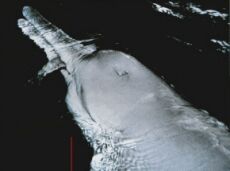Sucker Punch & Triumph Over Vicious Yangtze Dolphin
 I got punched in the head this morning.
I got punched in the head this morning.No, really. I did.
I had to go to the doctor early in the AM to get a routine blood test done - cholesterol.
On my walk home, as I listened to Gordon Lightfoot's "The Wreck Of The Edmund Fitzgerald" on my wife's iPod, as other Londoners londoned along the sidewalks londoning off to their London jobs, I encountered a cluster of Youths. One of the female Youths was verbally and physically attacking a male Youth who was doing his chivalrous best not to punch her teeth out. The other Youths loitered nearby making the odd comment or two about nothing in particular.
What with my being a Los Angeleno and all, I did not fear these Youths. After all, they probably were only carrying knives and they had clearly been awake all night downing this and that and whatnot and were probably ready to turn in, and it was 9 in the morning with all those Londoners around londoning to work, and I have been carjacked at gunpoint, you know, so ...
... forward I pressed, slaloming through the Youths.
Someone's fist, thrown from somewhere to my left and behind, struck the side of my head with all the speed and catastrophic impact of an inebriate's fist hitting you in the side of the head.
My glasses went flying into the street. I flashed back to being beaten up in 7th grade. And one of the female Youths (a different one from the first who was still assailing her boyfriend) laughed and observed that I had had my spectacles knocked off.
I retrieved the spectacles, looking back at who might have the culprit been who done struck me.
My bleary-eyed assailant sat round-shouldered on a front garden wall divining the pavement -unmoving now, silent.
Catatonia?
With one of those sudden, lightning remissions? Only to be followed by an equally rapid relapse?
I laughed good-naturedly, as is my want when being beaten up (see 7th grade, et al.), and continued on my way home where I immediately called the police - who are, I am promised, going to swing by sometime soon to take my statement.
In the meantime, we have eradicated our first dolphin. So that's at least some good news:
Scientists from North America, Europe and Asia have declared the Yangtze River dolphin or baiji (Lipotes vexillifer) extinct after an extensive survey of the middle-lower Yangtze River failed to locate any either by sight or acoustically.
 The baiji, long been recognised as one of the rarest and most critically threatened mammal species, now has the dubious honour of being the first cetacean species driven to extinction by human activity.
The baiji, long been recognised as one of the rarest and most critically threatened mammal species, now has the dubious honour of being the first cetacean species driven to extinction by human activity.This freshwater river dolphin is the sole living representative of the family Lipotidae (a group that diverged from other cetaceans about 20 million years ago) and is restricted to the middle-lower Yangtze River drainage and the neighbouring Qiantang River in eastern China.
The scientists carried out an intensive survey using both sight and acoustic methods in the main Yangtze River channel between Yichang and Shanghai (an in-channel distance of 1669 km) for a period of six weeks in November–December 2006, and failed to locate a single baiji.
According to the scientists: “The lack of any baiji sightings or acoustic recordings in the Yangtze during this survey forces us to conclude that the species is now likely to be extinct.
“While it is conceivable that a couple of surviving individuals were missed by the survey teams, our inability to detect any baiji in the main channel of the river despite this intensive search effort indicates that the prospect of finding and translocating them to an ex situ reserve has all but vanished.
“The continued deterioration of the Yangtze ecosystem means that the species has no hope of even short-term survival as a viable population in the river, if it has not already disappeared.”
The main threat that led to the decline and extinction of the baiji is primarily massive uncontrolled and unselective fishing, which led to many baiji being killed as by-catch.
The authors state that “Although relatively few data are available on baiji mortality, at least half of all known baiji deaths in the 1970s and 1980s were caused by rolling hooks and other fishing gear, and electro-fishing accounted for 40% of baiji deaths recorded during the 1990s...”
 The baiji is not the only species endemic to the Yangtze River that has gone extinct or is in very grave danger of doing so.
The baiji is not the only species endemic to the Yangtze River that has gone extinct or is in very grave danger of doing so.The Chinese paddlefish, Psephurus gladius, not reported since 2003, may have befallen the same fate, and the Yangtze finless porpoise (Neophocaena phocaenoides asiaeorientalis) has experienced a rapid decline.
The authors conclude with a chilling warning: “The baiji’s probable extinction serves as a potent reminder to conservationists that even large charismatic and nominally protected animals are still in grave danger of being lost; species cannot be expected to save themselves, and intervention may need to be swift and decisive.”
For more information, see the paper: Turvey, ST, RL Pitman, BL Taylor, J Barlow, T Akamatsu, LA Barrett, X-J Zhao, RR Reeves, BS Stewart, K-X Wang, Z Wei, X-F Zhang, LT Pusser, M Richlen, JR Brandon and D Wang (2007) "First human-caused extinction of a cetacean species?" Biology Letters doi:10.1098/rsbl.2007.0292

